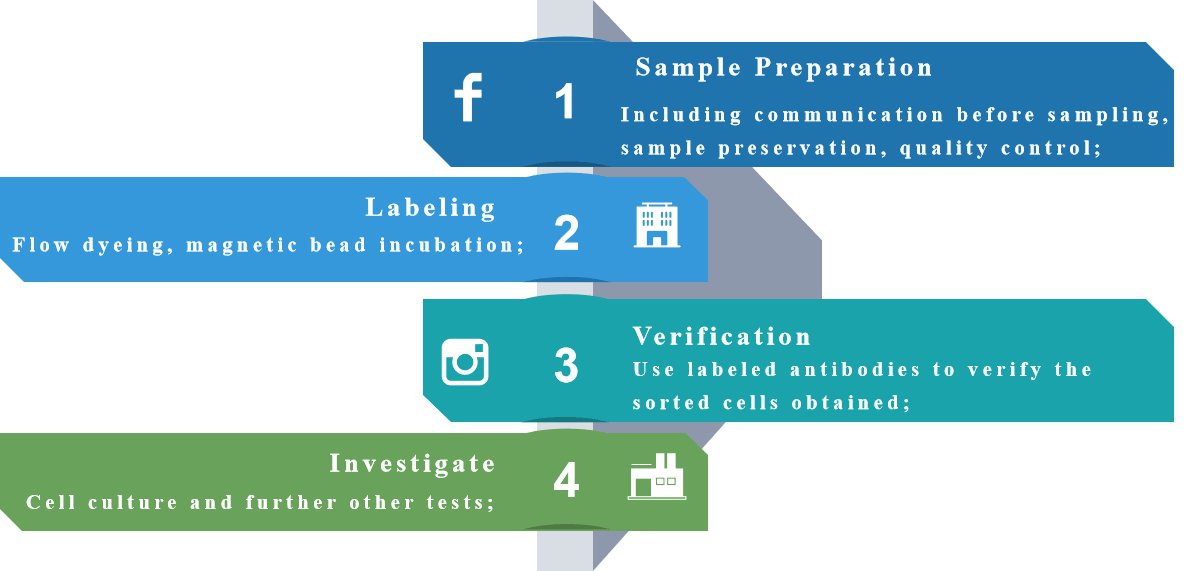Immune Cell Isolation and Culture Services
Creative Bioarray can successfully isolate and culture various types of immune cells from biological samples from different species. Using cytology techniques can isolate more specific immune subgroups and use them in bioassays and treatments. We have established a mature agreement and can provide separation and cultivation services with fast turnaround time according to your requirements.
About Immune Cells
Immune cell isolation and culture are necessary for basic research aimed at studying the functions of different immune cell types and for expanding specific immune cell populations for therapeutic purposes. The immune system is an important part of the body to resist foreign invasion and clean up its own alienated cells. During the physiological and pathological processes of the body, immune cells reach the whole body from the lymphatic organs through the vasculature and blood circulation. The analysis of immune cells is one of the most commonly used inspection methods to understand the immune status of the body in biological and medical research. Leukocytes/White Blood Cells in the blood contain various types of immune cells. Almost all immune response processes in the body are completed by the cooperation of various white blood cells. Therefore, they have always been the main objects of research on various infections, inflammations, autoimmune diseases, transplantation and other models. Leukocytes are divided into lymphocytes and myeloid cells from the origin. Almost all cells in the blood have the same source-Hematopoietic Stem Cells (HSC). Hematopoietic stem cells differentiate into Common Lymphoid Progenitors (CLP) and Common Myeloid Progenitors (CMP) in the bone marrow. CLP mainly differentiates into different lymphocyte populations, including B lymphocytes, T lymphocytes and natural killer cells (NK). Myeloid cells mainly include monocytes/macrophages, dendritic cells (DC) and granulocytes. Immune cells from different sources usually have their own unique combination of markers, which facilitates cell sorting.
 Fig 1. Traditional modes of cell separation currently used in the laboratory and clinic. (Plouffe B D, et al. 2014)
Fig 1. Traditional modes of cell separation currently used in the laboratory and clinic. (Plouffe B D, et al. 2014)
Immune Cell Isolation Services
Immune cell separation refers to the use of antibody-mediated recognition of specific cell surface antigens to enrich immune cell subsets, and then use flow cytometry, density centrifugation, or magnetic separation techniques for sorting or separation. Our separation service can provide antibody-based flow cytometry and magnetic separation services. Our flow sorting kits can be used for single-step staining. Each kit contains a variety of fluorescent dye-conjugated primary antibodies, which can be used to stain the cell types of interest at the same time. The cell types that can be analyzed include antigen-presenting cells, macrophages, mast cells, granulocytes, NK cells, T cells, B cells and other common immune cell populations, as well as other immune cell subpopulation analysis, such as Th1, Th2, Th17 , NKT cells and other subgroups. For isolated cells, we use cell type-specific labeled antibodies to verify the identity of the immune cells isolated, expanded, or differentiated in culture.
Immune Cell Culture Services
The sorted cells can be further cultured and analyzed. Our immune cell culture services include evaluation of cell function, cell proliferation and viability determination, and other further analysis, as well as further subcellular level analysis. The specific service content can be customized. Our experienced laboratory team will communicate with you and give you suggestions. We also provide reagents for studying cell proliferation, viability, migration and cytotoxicity, including fluorescent and non-fluorescent reporter dyes and MTT analysis. We will issue all data analysis reports and the most important results for you for your convenience.
 Fig 2. The service process of immune cell separation and culture.
Fig 2. The service process of immune cell separation and culture.
Creative Bioarray focuses on providing the highest quality reagents for the isolation, activation, differentiation and culturing of immune cells, providing immune cell services from sorting to culturing, helping our customers save time and effort. We provide a variety of reagents and consumables for cell screening, separation, identification and culture. You will benefit from our technical expertise and advanced facilities. Our scientific team will work with you to find the best solution to meet your needs.
If you are interested in our services or have any specific needs, please feel free to contact us. We look forward to working with you in the near future.
References:
- Rohde E, Bartmann C, Schallmoser K, et al. Immune cells mimic the morphology of endothelial progenitor colonies in vitro[J]. Stem cells, 2007, 25(7): 1746-1752.
- Plouffe B D, Murthy S K, Lewis L H. Fundamentals and application of magnetic particles in cell isolation and enrichment: a review[J]. Reports on Progress in Physics, 2014, 78(1): 016601.
- Cossarizza A, Chang H D, Radbruch A, et al. Guidelines for the use of flow cytometry and cell sorting in immunological studies[J]. European journal of immunology, 2019, 49(10): 1457-1973.
For research use only. Not for any other purpose.

 Fig 1. Traditional modes of cell separation currently used in the laboratory and clinic. (Plouffe B D, et al. 2014)
Fig 1. Traditional modes of cell separation currently used in the laboratory and clinic. (Plouffe B D, et al. 2014)
 Fig 2. The service process of immune cell separation and culture.
Fig 2. The service process of immune cell separation and culture.
